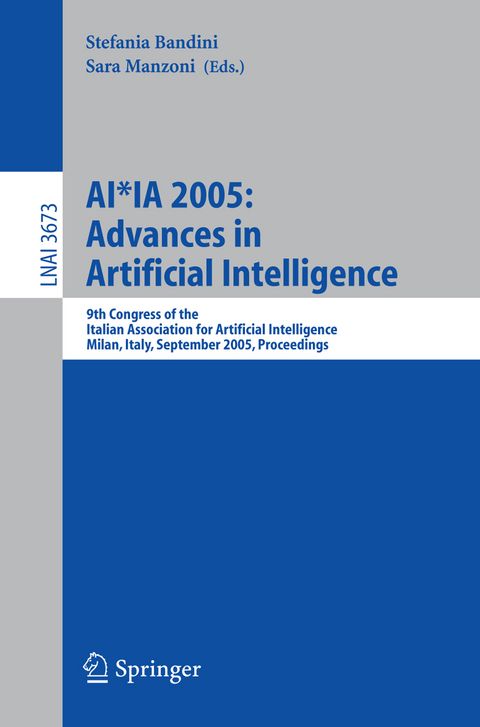
AI*IA 2005: Advances in Artificial Intelligence
Springer Berlin (Verlag)
978-3-540-29041-4 (ISBN)
Theoretical Research: Results and Proposals.- The Complexity of Action Redundancy.- On the Impact of Small-World on Local Search.- A Hybrid Logic for Commonsense Spatial Reasoning.- Using a Theorem Prover for Reasoning on Constraint Problems.- Good and Bad Practices in Propositionalisation.- Periodicity-Based Temporal Constraints.- A Survey of Problem Difficulty in Genetic Programming.- Intelligent Information Access by Learning WordNet-Based User Profiles.- Refined Approximation of Concepts in Ontology.- Theoretical Research: Improvements and Consolidations.- Argumentation for Access Control.- Determining Preferences Through Argumentation.- Avoiding Order Effects in Incremental Learning.- Evaluating Search Strategies and Heuristics for Efficient Answer Set Programming.- The SCIFF Abductive Proof-Procedure.- Scheduling with Probability and Temporal Constraints.- Schedule Robustness Through Broader Solve and Robustify Search for Partial Order Schedules.- Optimal Scheduling with Heuristic Best First Search.- Planning with Derived Predicates Through Rule-Action Graphs and Local Search Techniques.- The Architecture of a Reactive Path-Planner for Mobile Robots Based on Cellular Automata.- Modal Operators with Adaptable Semantics for Multi-agent Systems.- An Organisation Infrastructure for Multi-agent Systems Based on Agent Coordination Contexts.- Towards Fault-Tolerant Formal Concept Analysis.- Agent-Based Management of Responsive Environments.- An ACL for Specifying Fault-Tolerant Protocols.- Experimental Evaluation of Hierarchical Hidden Markov Models.- Optimization of Association Rules Extraction Through Exploitation of Context Dependent Constraints.- Automata Slicing for Diagnosing Discrete-Event Systems with Partially Ordered Observations.- Configurations for Inferencefrom Causal Statements: Preliminary Report.- Laying the Foundations for a Formal Theory of Drama.- A Semantic Kernel to Exploit Linguistic Knowledge.- Building a Wide Coverage Dynamic Grammar.- A Linguistic Inspection of Textual Entailment.- Multigranular Scale Speech Recognizers: Technological and Cognitive View.- Applications: Systems and Prototypes.- Towards a General Framework for Substitutional Adaptation in Case-Based Reasoning.- A Consumer Interest Prediction System from Transaction Behaviors in Electronic Commerce.- Dealing with Different Languages and Old Profiles in Keystroke Analysis of Free Text.- Learning Path Generation by Domain Ontology Transformation.- A Multidimensional Framework for the Representation of Ontologies in Adaptive Hypermedia Systems.- A Conversational Agent Based on a Conceptual Interpretation of a Data Driven Semantic Space.- Solving Italian Crosswords Using the Web.- A Counterfactual-Based Learning Algorithm for Description Logic.- Relational Learning: Statistical Approach Versus Logical Approach in Document Image Understanding.- Handling Continuous-Valued Attributes in Incremental First-Order Rules Learning.- Prototypal Ambient Intelligence Framework for Assessment of Food Quality and Safety.- Managing Clinical Guidelines Contextualization in the GLARE System.- Water Management Policy Selection Using a Decision Support System Based on a Multi-agent System.- A CSP Approach for Modeling the Hand Gestures of a Virtual Guitarist.- Experiences with CiceRobot, a Museum Guide Cognitive Robot.- Human-Robot Interaction Through Mixed-Initiative Planning for Rescue and Search Rovers.- Anchoring by Imitation Learning in Conceptual Spaces.- Bayesian Emotions: Developing an Interface for Robot/Human Communication.- Robot Security and Failure Detection Using Bayesian Fusion.- Applications: Case Studies and Proposals.- Mining Relational Association Rules for Propositional Classification.- Entity Recognizer in Hungarian Question Processing.- Recognition Algorithm for Korean Postpositions by Detecting Prosody Boundaries.- Fuzzy Multinomial Control Charts.- Fuzzy Logic Resource Manager: Fuzzy Rules and Experiments.- Application of PGA on Optimization of Distribution of Shopping Centers.- BIOPACMAS: A Personalized, Adaptive, and Cooperative MultiAgent System for Predicting Protein Secondary Structure.- Improving Neural Classification with Markov Chain.- Intelligent Neurofuzzy Model Based Control of Electrically Heated Micro Heat Exchanger.- Managing Functional and Ontological Knowledge in the Design of Complex Mechanical Objects.
| Erscheint lt. Verlag | 12.9.2005 |
|---|---|
| Reihe/Serie | Lecture Notes in Artificial Intelligence | Lecture Notes in Computer Science |
| Zusatzinfo | XIV, 614 p. |
| Verlagsort | Berlin |
| Sprache | englisch |
| Maße | 155 x 235 mm |
| Gewicht | 1940 g |
| Themenwelt | Informatik ► Software Entwicklung ► User Interfaces (HCI) |
| Informatik ► Theorie / Studium ► Künstliche Intelligenz / Robotik | |
| Schlagworte | Agents • AI logics • Algorithmic Learning • Artificial Intelligence • classification • Computational Linguistics • Distributed Artificial Intelligence • Human-Robot Interaction • Intelligence • Intelligent Information Processing • Intelligent Systems • Knowledge • Knowledge Processing • Knowledge Representation • learning • machine intelligence • machine learning • mulit-agent systems • Neural Computation • robot • Robotics • Speech Recognition • theorem proving |
| ISBN-10 | 3-540-29041-9 / 3540290419 |
| ISBN-13 | 978-3-540-29041-4 / 9783540290414 |
| Zustand | Neuware |
| Haben Sie eine Frage zum Produkt? |
aus dem Bereich


